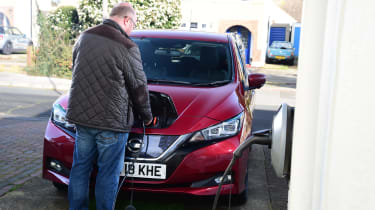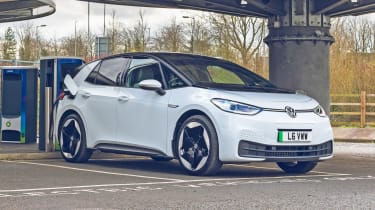How much does it cost to charge an electric car?
Book with Campervan Bergen, the cheapest in the market and the best quality
How to book the van
It should cost less to run an electric car than a petrol or diesel one, but exactly how much does it cost to charge one up?
Electric cars are quieter, faster, and more relaxing to drive than petrol or diesel cars, but the most important benefit of EV ownership in many people’s opinion is that they’re generally much cheaper to run. Currently, electric cars are exempt from road tax (VED) and the London Congestion Charge, plus maintenance costs should be much lower too, as EVs don’t need to be serviced nearly as often as petrol or diesel cars do.
But exactly how much does it cost to charge an electric car? There are multiple ways to charge at home or using the UK’s public charging network, and the cost varies widely. It depends on many factors, including where you charge, when you charge, your car’s battery size, how much charge you need and what speed you charge at.
Here, we’ve detailed everything you need to know about charging your electric car, the estimated costs and what to expect when charging.

Cost of charging at home
One of the key upsides to owning an electric car is the ability to charge it at home. You’re likely to find it makes sense to get your car ready for the next day’s driving by charging at home most of the time, since you’re there every night. The government’s ‘Go Ultra Low’ campaign calculated that 90% of electric-car charging is done at home – but there are plenty of charging solutions now available for those without off-street parking.
While it’s not recommended that you do this all the time, it’s possible to use a conventional three-pin plug to charge an electric car. There’s no installation cost to using a three-pin plug, as you just need to run a cable – which usually comes standard with EVs, but not always – to the nearest socket. However, this method of charging is the slowest possible, and manufacturers recommend that you only use it as a last resort if it’s not possible to use a wallbox, such as when visiting a friend’s house.
Instead, many choose to install a home wallbox. Home chargers can supply power at between 3.7 and 22kW, but most operate at 7.4kW. The prices of these units vary drastically between brands but, as an example, a Pod Point Solo 3 home charger capable of 7kW speeds and with a cable built-in will cost around £1,000 to purchase and install. It’s worth shopping around, though, as plenty of other companies can supply 7 or 7.4kW home wallboxes, and those without a cable built-in will cost a little less, too.
At the time of writing, the average electricity cost in the UK is 34 pence per kilowatt-hour (kWh). So, using a 7kW wallbox to fully recharge a Volkswagen ID.3 with a 58kWh battery would take a little over nine hours, and cost you approximately £20. With the ID.3’s claimed range of up to 264 miles, that works out to around 13 pence per mile. For a rough comparison, a typical petrol car costs nearly 20 pence per mile to run, so even with today’s high energy prices, electric cars charged at home are still cheaper to fuel.

Cost of public charging and charging at motorway services
As a general rule, you can expect to pay a lot more when charging an electric car with a public charger compared to topping up at home, however the exact cost depends on the charger you visit. The UK’s nearly 40,000 public chargers are run by various charging networks, each with their own pricing structures, and some can achieve far faster speeds than most home wallboxes, which is worth keeping in mind.
We’ll take the Gridserve Electric Highway as an example because you’re likely to find some of its chargers if you stop at a service station. Prices start at 49p pence per kilowatt-hour if you’re using a slower AC charger (up to 22kW), while energy from its ‘Medium Power’ chargers (up to 60kW) is 65p/kWh. Finally, you have Gridserve’s ‘High Power’ chargers (up to 350kW), which cost 66p/kWh.
At 66p/kWh, a 10-80% top-up of a 58Wh Volkswagen ID.3 would cost around £27 and give you around 200 miles of range in return. It’s worth finding out what your car’s fastest charging rate is, if you don’t know already – there’s no point paying through the nose to use a 350kW ultra-rapid charging point if the car itself can only charge at 100kW maximum and there’s a slightly slower and cheaper charging point you could use instead.
Other major charging networks in the UK to look at include Osprey (up to 72p per kWh), MFG (79p per kWh), Shell Recharge (up to 85p per kWh), BP Pulse (up to 65p per kWh), InstaVolt (75p per kWh), IONITY (69p per kWh) and Tesla Supercharger (average 45p/kWh). If you are a frequent user of one of these networks, some, like BP Pulse, offer discounted rates for subscribers or registered users.
You can use Zap-Map’s website or app to find the nearest locations to you, as well as see the most up-to-date pricing information.

